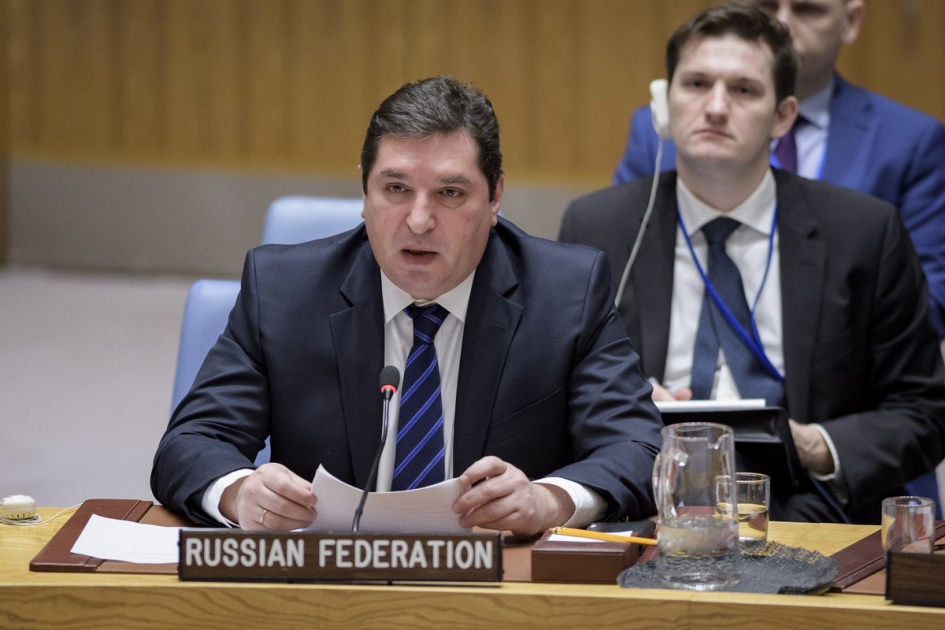Statement by Mr.Vladimir Safronkov, Deputy Permanent Representative of the Russian Federation to the United Nations, at the Security Council on the situation in the Middle East, including the Palestinian question
We would like to thank Mr. Mladenov for his briefing on developments in the Middle East.
The situation in this region plagued by crises old and new remains problematic and demands considerable collective efforts, including by the Security Council.
The only way we can make progress on stabilizing and normalizing the situation in the region is by acting together, regardless of the differences in our approaches. By presenting the broadest possible united front, which Russia’s President Vladimir Putin has called for, we can achieve substantive breakthroughs in combating terrorism.
Together we can end the bloodshed in Yemen, stabilize Libya, help Syrian refugees return home, tackle the global migration crisis, support normalization in Iraq and end the stalemate in other crises. And, of course, through our joint efforts we can sort out the Palestinian-Israeli peace process. We can say that based on our experience of friendly relations with the Arab States, Palestine and Israel.
The foundations for our cooperation exist. They are based on international law, including the Charter of the United Nations and many Security Council resolutions. Our main tools should be dialogue and mediation, and we should refrain from unilateral steps. We cannot achieve lasting solutions to these crises any other way.
The need for urgent collective action is greatest with regard to the Palestinian-Israeli issue, which is at the epicentre of the turmoil in the Middle East. Resolving it is key to improving the situation in the entire region. We have regretfully had to conclude that against a backdrop of increasingly frequent attempts to aggressively revise previously settled agreements aimed at achieving sustainable Palestinian-Israeli and ArabIsraeli settlements on an internationally recognized basis, the prospects for a resumption of the negotiation process are still faint. The misunderstanding and mistrust between Palestinians and Israelis is growing constantly. Aggressive attitudes are intensifying and violence, unilateral measures and provocative rhetoric are coming to the fore. But there is an alternative to the current developments, which entails implementing the steps outlined in the 2016 report of the Middle East Quartet.
Implementing its recommendations would enable us to stop the violence, whose victims are Palestinians and Israelis alike, and to tackle the familiar destabilizing factors hindering progress on the political process, including the settlement activities and the rupture between the West Bank and Gaza. Bringing that sector back under the control of the legitimate authorities in Ramallah under the leadership of President Abbas would strengthen the international community’s humanitarian efforts there.
We should emphasize in particular that every step taken should be geared to ensuring and restoring Palestinian unity. It is urgent that we intensify our collective diplomacy in order to prevent a collapse of the efforts that the international community — all of us — have jointly undertaken, including in the Security Council, for the sake of ensuring the conditions for implementing the only viable solution, which is the establishment of two States through direct negotiations between Palestinians and Israelis. It is direct dialogue that can find answers to all final status issues regarding Jerusalem, refugees, borders and security.
Dismissing those problems will not work. Any future deal must take account of these issues, which are so sensitive and significant for both parties. Russia will continue to maintain its principled and consistent position that a comprehensive and lasting settlement between Palestinians and Israelis and Arabs and Israelis can be achieved on the basis of internationally recognized principles, including the Security Council’s resolutions, the Arab Peace Initiative, the Madrid principles — including the principle of land for peace — and the two-State formula, which provides for the creation, through negotiations, of an independent State of Palestine living side by side in peace and security with Israel.
Policies that seek to change the facts on the ground are unacceptable, and we reject violence in any form. We consider the expansion of Israeli settlements, the demolition of Palestinian property and the expulsion of Palestinian families to be illegal. Russia will continue to play an active role in restoring peace in Israel, Palestine and the entire Middle East in its capacity as a permanent member of the Security Council and a participant in the Middle East Quartet, which remains the only mediation format approved in Security Council resolutions.
Our offer to convene a summit in Russia between the leaders of Palestine and Israel is still on the table. We will continue to assist the United Nations Relief and Works Agency for Palestine Refugees in the Near East, whose critical humanitarian activities have an important stabilizing effect in the Palestinian territories and the countries of the Middle East.
In conclusion, we want to once again call for genuine collective efforts in the Middle East. Despite the evolving realities, we must help to create conditions there that are conducive to strengthening a general atmosphere of trust, which is hugely important to the relations between the Arab States, Israel and Iran. We would like to remind members that in its resolution 598 (1987), the Security Council directed the SecretaryGeneral to work with regional stakeholders on measures to strengthen security and stability in the region.
It is time to implement that resolution. In that context, we believe that the Russian blueprint for security in the Persian Gulf could be very helpful. Russia stands ready to work on all of those aspects, and others, with interested partners on a basis of openness and impartiality.
